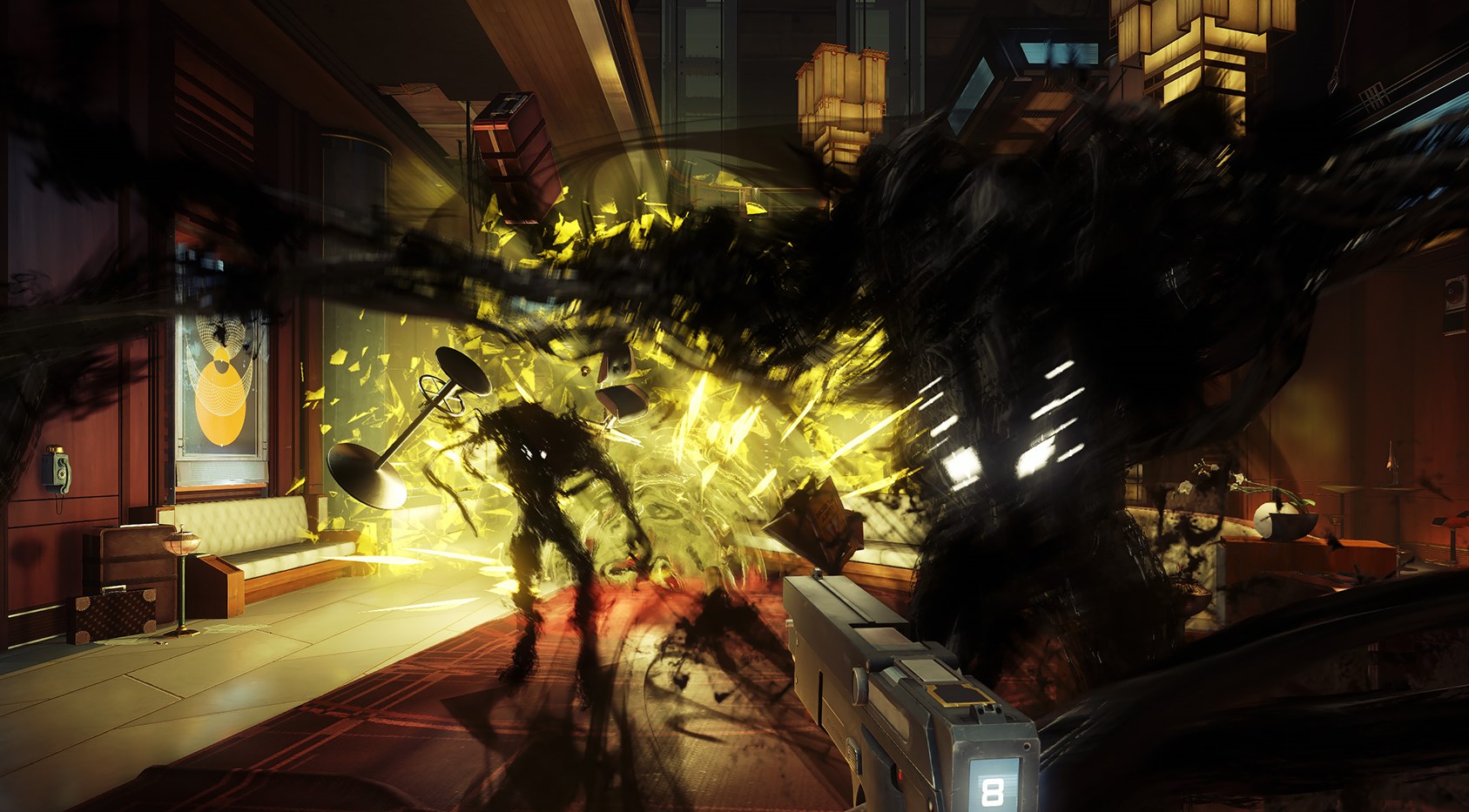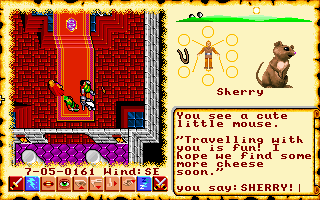The designers of Dishonored, Bioshock 2 and Deus Ex swap stories about making PC's most complex games
We brought together an all-star cast of designers to chat about the past, present, and future of immersive sims. Read, or listen along!

PC Gamer: I think that gets to an interesting point: all this player freedom you have in an immersive sim, it generates good stories like that. The thing that people love about these games is the stories they generate out of the game, the same way you generate a story in Civilization where you were at war with Gandhi for 200 years or something. In an immersive sim, people don't usually talk about the story that was written. They talk about the story of that time they played it and these seven systems interacted in some insane improbable way. So I want to get you guys to tell some anecdotes, either from playing or designing immersive sims, maybe your awakening moment to 'oh shit, this game or genre is amazing, and this is why.'

Co-creative director of Arkane Studios. Harvey Smith was the creative director for both Dishonored and Dishonored 2 and lead designer of Deus Ex.
Harvey: That improvisation thing you're talking about is definitely one of my favorite aspects. Doug Church is probably the first person I heard talking about that. We were standing in my office one day and he was like, 'people talk about their D&D experiences or their experiences in games like these as if they actually happened to them. I did this, and then this thing fell over, and then this happened.' It's so true.
There were epiphanies like that with Adventure, the Atari 2600 game, because it was so procedural. But really, Ultima Underworld, I remember getting to the temple of the bullfrog or something, a puzzle where you can un-invert a ziggurat so that you can cross this big pit. And I hate puzzles like that. There are a couple dials on the wall. It's like, oh my god, another puzzle. But I found that if you jump—the far lip is a little higher than the lip you start on, so you can't just cast levitate and glide across. But I found that if you jump and then cast levitate at the apex of the jump, you could levitate across and land on the other side. And you feel very clever for defeating the puzzle without solving the puzzle. That is a magical moment in my life, and in my career, for sure.
I have a bunch of those anecdotes from Far Cry 2, of course. We had one recently with Dishonored 2 where the Game Informer guys were there, and we had a very controlled demo that we gave people, where there were a bunch of Overseers executing a heretic, and there was a certain way we did it, just before the guy on the firing squad pulled the trigger, we used Emily's Far Reach to yank him up to the balcony where we were. Anyway, the demo went super well, they loved the game, but they said 'hey, our heads were down, we were writing, can you run through it one more time?' So Dinga, our lead designer, Dinga Bakaba, was like 'hey, you know what, you've seen the game, you like the game, you get the game. I'm going to just leave the beaten path and improvise here and do some stuff that maybe isn't as expected.'

So he went back to the firing squad scene and used Emily's Domino power to link the heretic in front of the firing squad with the guy who was about to pull the trigger. We had no idea what was going to happen, because we literally didn't set that up. We didn't say, explicitly, in the code anywhere. We just said 'if you're Dominoed to to someone else you take the damage type that they receive.' So the guy in the firing squad pulled the trigger and killed the heretic, and he died at the same time. Everybody in the room, their heads just popped, like 'Holy shit.'
What they didn't realize at the time was we had no preparation for that. Dinga was worried even as he tried it that maybe for some reason it wouldn't work. But those improvisational moments, as Ricardo says it's hard to train the players to play games like this, but once they do, especially if they'll play a second time… If you go play System Shock or Far Cry 2 or Prey or Dishonored a second time, the intimidation of learning the systems and knowing the game space is gone, and you get back to that joy Steve Gaynor was talking about where you're playing at this point. You're improvising and experimenting and it's beautiful.
Ricardo: If I can just piggyback off of that, I know exactly the moment you're talking about, because I played through Dishonored 2 with my daughter, who's never played a game like that before. And it was so amazing to see the game through her eyes. She's never played an immersive sim, and that specific scene, I did the same thing with the Domino, and it was a magical experience to her that something like that could even happen, and that then afterwards the guards were baffled like 'someone's here, there's a murderer, search the area.' It was really cool to see someone experience that for the first time.
The biggest gaming news, reviews and hardware deals
Keep up to date with the most important stories and the best deals, as picked by the PC Gamer team.
Harvey: That's really gratifying to hear.
Steve: Something that's interesting about immersive sims is that oftentimes, like you're talking about, players will find exploits that are a legitimate combination of systemic interactions that the designers weren't expecting. I feel like the classic example is using wall mines to climb walls in Deus Ex.
If you play [an immersive sim] a second time, the intimidation of knowing the game space is gone... You're improvising and experimenting and it's beautiful.
Harvey Smith
So when I was playing Dishonored 2, I really like doing the slide move, and also I'm playing totally non-lethally. And at some point I was like, can I do a non-lethal takedown on a guy while I'm sliding into him? And I just tried it out. And I found that, beautifully, you have a whole set of custom animations for doing a non-lethal takedown while sliding. When I found that, I thought, that's cool. Then I thought through how the systems work and I'm like 'wait, this is an instant non-lethal takedown on a guy, whether he's aggro or unaware,' which is the only way aside from a tranq dart that you can non-lethally take down a guy instantly no matter what state they're in. If they're aggro on you you have to deflect their blow, then take them out.
At that point I realized the only way I'm going to defeat anyone for the rest of the game is sliding into them and knocking their head into the ground.
That was about the mid-point through the campaign, and for the rest of the game my entire playstyle was about how do I set up this encounter where there's three patrollers around, maybe Domino all three of them together so I can slide-tackle into one of them, or XYZ. Setting up those challenges for yourself, saying 'oh, wait, here's this edge case of how all these systems interact, and that allows me to act like a freakin' weirdo.' But the game supports it, and there's the satisfaction and the robustness of saying 'yes, I'm doing something totally strange and comical, but the game is there for it.' It's actually a legitimate way to play even though that was probably not something QA was going through saying 'let's do an all-slide tackle run, make sure that doesn't break anything.'

Tom: It's funny how once you're immersed in these games, learning the rules and then using those rules becomes entirely what your brain is occupied with and you don't really care if it's realistic or makes sense. When you asked for anecdotes from playing immersive sims, the one that sprang to mind is one in Deus Ex where I had started to hack into a terminal that could open Gunther's cell on Liberty Island. As I hacked it I was looking through the camera that shows the view of the room I was in, I could see myself hacking the terminal, and a guard ran in. And guards aren't allowed to shoot you when you're using computers in Deus Ex.
[Warren puts his head in his hands and shakes it, moaning softly]
Tom: So I could see he's pointing his gun to my head, but can't fire, because I'm busy! I had to figure out, I was playing on Realistic where you just die in one shot from those guys at close range. I can't leave the terminal now because I'll die instantly, so I had to figure out a way, with just the tools I have now, to try to block this guy from shooting me. The turret couldn't shoot him. But I figured out if I open Gunther's door it'll nudge him a little bit around the corner so he no longer has line of site, so I can leave the computer and attack him.
Warren: I'm so proud.
Tom: And there was never a thought in my head that this was any way unrealistic or strange. I just thought, this is amazing!
Warren: I have two anecdotes. One, on Ultima VI, which is kind of where I realized that all this improvisational stuff could really be magical. It was unplanned, kind of a bug. There was one puzzle where the Avatar and his party came up on one side of a portcullis and there was a lever on the other side of the portcullis that you had to flip to raise the portcullis and keep on making progress. I watched one of our testers, a guy named Mark Schaefgen, playing in that area. And he didn't have the telekinesis spell, which was the way to get past that portcullis. I was sitting there rubbing my hands together going 'oh ho ho, he's screwed, he can't do it.'
He had a character in his party named Sherry the Mouse. You can probably see where this is going. The portcullis was 'simulated,' and here the air quotes are around simulated, simulated enough that there was a gap at the bottom that was too small for a human to get through, but not too small for Sherry. He sent Sherry the Mouse under the portcullis, over to the lever, she flipped the lever, and then the rest of the party went through. And I fell on the floor. At that moment I just said to myself, 'this is what games should do. We should start planning this, not having it happen as a bug.' That was where I realized this was really powerful.
The Deus Ex story that kills me, though. A year after we shipped, I was out in San Francisco at the Eidos offices, and our publisher-side QA lead, a guy named Charles Angel, was playing the game, demoing it for some executives. Now why Eidos executives needed a demo of a game that had shipped a year earlier that had won like 35 game of the year awards I will never understand. But they did. I'll probably never work again for having said that, but anyway.

I was watching him on Liberty Island, and there was a spot where a guard was standing on one side of a doorway, there were two or three guards on patrol on the other side of the doorway, and there were laser triggers covering the doorway. And so what he did was, he secretly was sneaking around, moving explosive barrels around and stuff. I was watching him, and I kind of knew what he was setting up. He crept back and got out the pistol, which was the weakest weapon in the game, and with one shot he took out the guard that was guarding the door, took out the laser triggers, and because he had waited for the right exact moment, took out the two guards on the other side of the door. With one shot. And I fell on the floor again. Because I'm completely certain that no human on the face of the earth had tried that before. No one on the team... Harvey, if you knew that was going to work, I'll buy you lunch next time I see you.
Harvey: No, of course, we didn't set those things up explicitly, that's just one of the pleasures, you know. Warren and I both had this experience, and we have it now with Prey and Dishonored games, going down and watching the QA testers play is just magical because they chain things together, they use powers in unexpected ways, and then often they require a little support. Because to Steve Gaynor's example, nowadays the production values have gone up so you might need animation support and things like that.
But yeah, it's amazing, and to get back to the critical side of this conversation from the love side so much, it gets back to one of the inherent problems with what we do. Which is, I've played Prey a lot and commented a lot, but I've started, instead of playing across many different builds and powers, I'm in one big contiguous playthrough now that I know the game super well. That always contextualizes your experience at the end of the project. It's magical.
There are several steps like that. The other is taking an Xbox home and playing on your own rig or whatever. The environment even changes it for you. In any case, getting back to the critical part, we have a game that if you play twice, or three times or four times, and you become a virtuoso with the systems and understanding the narrative and the world, little epiphanies are popping off in your head all the time and you're having these improvisational experiences. In Prey I'm not only doing that game mechanically but I'm doing that narratively and emotionally. I won't spoil anything but I gave an example to Ricardo yesterday related to what one of the monsters mutters, and how it connects back to a human in the world, who has a real history in the world.
Ricardo: I think we've talked about that if you want to mention it.
Warren: You're choosing your words reeeeally carefully right now, aren't you?
Harvey: The point is if you've played a lot, you get a lot out of these games, but the downside is if you haven't played, you struggle initially with the sheer complexity of it, or you're thrown right in. It almost works like a novel where to fully understand it you feel like you have to have seen the beginning, middle and end. They're very complicated economically and narratively and in terms of systems, and in order to make them sing you have to be a performer. You have to practice and learn. Whereas in other games you just drop in and look like a badass instantly, even if you're following a trail of breadcrumbs and kicking off a sequence of scripted events over and over.
On the next page, our panel talks about the challenges of designing immersive sims and their many interlocking pieces.

Wes has been covering games and hardware for more than 10 years, first at tech sites like The Wirecutter and Tested before joining the PC Gamer team in 2014. Wes plays a little bit of everything, but he'll always jump at the chance to cover emulation and Japanese games.
When he's not obsessively optimizing and re-optimizing a tangle of conveyor belts in Satisfactory (it's really becoming a problem), he's probably playing a 20-year-old Final Fantasy or some opaque ASCII roguelike. With a focus on writing and editing features, he seeks out personal stories and in-depth histories from the corners of PC gaming and its niche communities. 50% pizza by volume (deep dish, to be specific).

